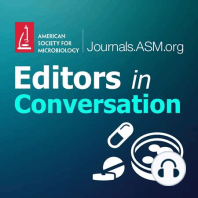44 min listen

The Best Clinical Microbiology Papers of 2022 (JCM Ed.)
The Best Clinical Microbiology Papers of 2022 (JCM Ed.)
ratings:
Length:
67 minutes
Released:
Dec 7, 2022
Format:
Podcast episode
Description
As we enter into the holiday season, many of us look forward to celebrating long-standing traditions with family and friends, which is no different from us here on the podcast! While not necessarily as long-standing as some of the other classic holiday traditions, after 2.5 years on air, we on this podcast have established our own end-of-year tradition, which is to take a look back at some of our favorite papers or more intriguing manuscripts published in the Journal of Clinical Microbiology over the past year. And so as you’ll see, thanks to the different areas of expertise and general interest among our panel today, we’ve selected quite a variety of papers to discuss, ranging from evaluation of new blood culture systems to use of metagenomics for infective endocarditis and to the potential application of interferon gamma release assays for detection of Histoplasma infections. And so, suffice it to say, there will be something of interest for everyone listening. But, for those watching today, you are clearly getting an extra special treat as you get to see us do this episode wearing our best holiday gear and accessories. Guest: Dr. Trish Simner. Links: Nasal Swab Performance by Collection Timing, Procedure, and Method of Transport for Patients with SARS-CoV-2. DOI: https://doi.org/10.1128/JCM.00569-21 Multicenter Postimplementation Assessment of the Positive Predictive Value of SARS-CoV-2 Antigen-Based Point-of-Care Tests Used for Screening of Asymptomatic Continuing Care Staff. DOI: https://doi.org/10.1128/JCM.01411-21 Laboratory Safety: Handling Burkholderia pseudomallei Isolates without a Biosafety Cabinet. DOI: https://doi.org/10.1128/JCM.00424-21 The clinical utility of 2 high-throughput 16S rRNA gene sequencing workflows for taxonomic assignment of unidentifiable bacterial pathogens in MALDI-TOF MS. DOI: https://doi.org/10.1128/JCM.01769-21 Performance of Fully Automated Antimicrobial Disk Diffusion Susceptibility Testing Using Copan WASP Colibri Coupled to the Radian In-Line Carousel and Expert System. DOI: 10.1128/JCM.00777-21 Benefits Derived from Full Laboratory Automation in Microbiology: A Tale of Four Laboratories. DOI https://doi.org/10.1128/JCM.01969-20 Reflex Detection of Ciprofloxacin Resistance in Neisseria gonorrhoeae by Use of the SpeeDx ResistancePlus GC Assay. DOI: https://doi.org/10.1128/JCM.00089-21 Comparative Performance of Latest-Generation and FDA-Cleared Serology Tests for the Diagnosis of Chagas Disease. DOI: https://doi.org/10.1128/JCM.00158-21 Diagnosing Pulmonary Tuberculosis by Using Sequence-Specific Purification of Urine Cell-Free DNA. DOI: https://doi.org/10.1128/JCM.00074-21 Indeterminate QuantiFERON Gold Plus Results Reveal Deficient Interferon Gamma Responses in Severely Ill COVID-19 Patients. DOI: https://doi.org/10.1128/JCM.00811-21 Visit journals.asm.org/journal/jcm to read articles and/or submit a manuscript. Follow JCM on Twitter via @JClinMicro
Released:
Dec 7, 2022
Format:
Podcast episode
Titles in the series (81)
New Vancomycin Guidelines (AAC ed.): Discussing new guidelines on the use of vancomycin for severe Staphylocccus aureus infections. The August issue of AAC includes interesting papers about mechanism of resistance to metronidazole in C. difficile, a variant of KPC resistant to... by Editors in Conversation